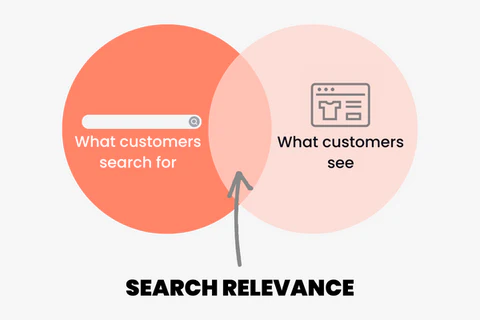What is Recall in eCommerce site search?
Recall is the ability of a search engine to find all relevant results for a certain query, regardless of where they show in the search results. In simple words, recall is a measure of how many relevant objects in the database were found in response to a certain search query.
A high recall means that the search engine found a lot of relevant results for a certain question. A low recall means that the search engine missed some relevant results. A good eCommerce search engine should aim for high recall because this makes sure that buyers can quickly and easily find the goods they want.
Example of recall in search
For example, let’s say a person goes to an eCommerce site and looks for a “black leather jacket”. If the search engine has a high recall, it should find all of the site’s black leather jackets, no matter how famous they are or how closely they match the user’s search.
On the other hand, if the search engine has a low recall, it may only find some of the black leather jackets. This could cause the user to miss relevant results and make their search experience unpleasant.
The differences between recall and precision in search
Recall and precision are two important ways to measure how well a search engine works. Together, they paint a fuller picture of a search engine’s ability to return relevant results for a particular query.
Precision is a measure of how many of the results that were found were related to the search. In words, it counts how many of the search results are actually related to what the user is looking for. A high precision means that most of the results are relevant to the search, while a low precision means that many of the results are not related to the search.
For example, if a search engine finds a lot of results that aren’t related to the question, it may increase recall but decrease precision, and vice versa.
The relationship between recall and search relevance



When it comes to how well a search engine works, recall and search relevance are closely tied. A recall is a measurement of how well a search engine can find all relevant results for a given query, no matter what order they show in. In addition, search relevance is how well the search engine’s results match the user’s question.
Most people want a search engine to have a high recall, which means that it can find a high percentage of appropriate results for a given query. This is especially important if the user isn’t sure exactly what they want or if they are using vague words in their search. In these situations, a search engine with a high recall rate is more likely to show results that are useful to the user.
But just having a high recall isn’t enough to make sure that the search results prove helpful to the user. Search relevance is what makes sure that the results match up to what the user was searching about. A search engine with high recall but low relevance may return many results, but the user may have to sort through a lot of unrelated results to find what they need. This can be annoying and take a lot of time.
How to improve recall in eCommerce site search
Using Synonyms
Synonyms are words or phrases that mean the same thing or something close. By using synonyms in your eCommerce site search, you can improve recall by making sure the search engine finds all the relevant results, even if the user used different words to describe them.
For example, if a user looks for “jogging shoes,” the search engine should also return results for “running shoes” and “athletic shoes.” Simply adding synonyms to the search algorithm, the engine will soon be able to recognize these similar words and find every match that is relevant to the user’s search.
Suggestions for Auto-Completion
By providing alternative or similar keywords, auto-complete suggestions can help users narrow their search queries and increase recall. When a user begins typing a search query, the search engine may recommend common or related terms that the user may not have noticed based on prior search history and user behavior. This can assist the user in refining their query and obtaining more relevant results.
Detailed Search
Faceted search lets users narrow down their search results by adding filters or groups to their search queries. This may enhance recall by letting users find relevant results even when their original search was too broad or unclear. For example, if a user searches for “shoes,” the number of outcomes may be excessive. But if there is a faceted search, they can filter their search results by brand, color, size, price, or other categories, which can help them discover more appropriate results.
















